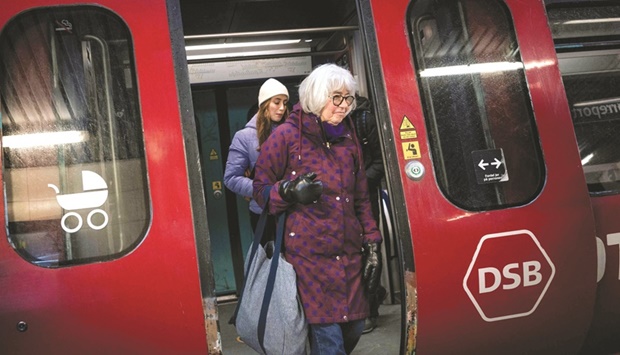Denmark waved goodbye to face masks and health passes yesterday as it became the first European Union country to lift all of its domestic Covid curbs despite record numbers of cases of the milder Omicron variant.
Norway will also scrap most of its remaining Covid-19 lockdown measures with immediate effect as a spike in coronavirus infections is unlikely to jeopardise health services, the prime minister said yesterday.
Only a few restrictions remain in place at Denamark’s borders, for unvaccinated travellers arriving from non-Schengen countries.
After a first attempt at lifting restrictions between September and November, the Scandinavian country once again ditched its Covid checks and limited opening hours for bars and restaurants.
“For me, the best part is that we don’t need to wear masks anymore,” Natalia Chechetkina, a receptionist in Copenhagen, told AFP.
“At least now we have a choice — if we want to protect ourselves or we want to feel free.”
Marie Touflet, a 23-year-old French student in the capital, said it was “pretty strange to take the metro without a mask, compared to France”.
“It’s really nice to be able to see people’s faces and it feels like we’re living normally again,” she said.
The easing comes as Denmark registers around 40,000-50,000 new Covid cases a day, or almost 1% of the country’s 5.8 million inhabitants.
Health officials believe those figures will soon start going down.
“There are strong indications that the infection has peaked in the areas where it has been most pronounced,” Tyra Krause of Denmark’s public health and research institution SSI told news agency Ritzau.
“So it’s super good timing for the restrictions to be eased.”
More than 60% of Danes have received a third dose of a Covid-19 vaccine — one month ahead of health authorities’ schedule — compared to an EU average of just under 45%.
Including those who have recently had Covid, health authorities estimate that 80% of the population is protected against severe forms of the disease.
“With Omicron not being a severe disease for the vaccinated, we believe it is reasonable to lift restrictions,” epidemiologist Lone Simonsen of the University of Roskilde told AFP.
Two years after the start of the pandemic, the Danish strategy enjoys broad support at home.
In a poll published Monday by daily Politiken, 64% of Danes surveyed said they had faith in the government’s Covid policy, while the lifting of restrictions also has widespread support in parliament.
Going forward, Danes are being urged to exercise personal responsibility.
“Without a Covid pass there will be a shift of responsibility,” Simonsen said.
Danes have increasingly used home tests to detect infection, but these are now being phased out and instead, anyone with symptoms is advised to stay home.
The Danish Health Authority currently “recommends” those who test positive to isolate for four days, while contact cases no longer need to quarantine.
Face masks and the Covid pass are also recommended for hospital visits.
Denmark lifted restrictions as the World Health Organisation (WHO) chief yesterday warned it was too early for countries to either declare victory over Covid-19 or give up attempts to halt transmission.
One of the rare critics in Denmark was the country’s Gout Association.
“We think it’s important to continue using masks as long as the infection is spreading widely,” association director Mette Bryde Lind said.
Eskild Petersen, an infectious disease specialist, said the Danish strategy was “a bit of an experiment”.
“I would have liked for us to wait 10-14 days after changing quarantine rules before abandoning masks and opening up nightlife” again, he told public television broadcaster TV2.
Meanwhile, Norway was also gung ho.
“Even if many more people are becoming infected, there are fewer who are hospitalised. We’re well protected by vaccines. This means that we can relax many measures even as infections are rising rapidly,” Prime Minister Jonas Gahr Stoere said.
The announcement follows similar decisions by other European countries including Britain, Ireland and The Netherlands, which have eased or removed restrictions in recent weeks.

Unmasked commuters at the Noerreport metro station in Danish capital Copenhagen yesterday. (AFP)
